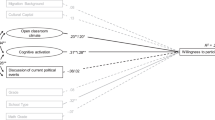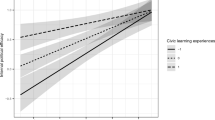Abstract
Adolescents’ political socialization is crucial for their future political participation. Little research has examined this relationship and the importance of citizenship self-efficacy in an Asian context. This study focused on the effectiveness of Korean adolescents’ political socialization and self-efficacy on their expected electoral participation. Data from Korean 8th graders participating in the 2016 International Civic and Citizenship Education Study were examined (N = 2601; Mage = 14.02; 46% female). Political socialization included open classroom discussion, active learning strategies, and formal citizenship education. The result showed that citizenship self-efficacy is the most important predictor for Korean adolescents’ future engagement, but open classroom discussion is not significant. It indicates that citizenship education needs to consider countries’ social and cultural contexts.
Similar content being viewed by others
References
Ahn, H. S., Usher, E. L., Butz, A., & Bong, M. (2016). Cultural differences in the understanding of modelling and feedback as sources of self‐efficacy information. British Journal of Educational Psychology, 86(1), 112–136. https://doi.org/10.1111/bjep.12093.
Alvarez, M., Cheibub, J. A., Limongi, F., & Przeworski, A. (1996). Classifying political regimes. Studies in Comparative International Development, 31(2), 3–36. https://doi.org/10.1007/BF02719326.
Bandura, A. National Inst of Mental Health. (1986). Social foundations of thought and action: A social cognitive theory. Prentice-Hall, Inc.
Bandura, A. (1997). Self-efficacy: The exercise of control. New York: W.H. Freeman.
Bowler, S., & Donovan, T. (2013). Civic duty and turnout in the UK referendum on AV: What shapes the duty to vote? Electoral Studies, 32(2), 265–273. https://doi.org/10.1016/j.electstud.2012.10.011.
Campbell, D. E. (2008). Voice in the classroom: How an open classroom climate fosters political engagement among adolescents. Political Behavior, 30(4), 437–454. https://doi.org/10.1007/s11109-008-9063-z.
Castillo, J. C., Miranda, D., Bonhomme, M., Cox, C., & Bascopé, M. (2015). Mitigating the political participation gap from the school: The roles of civic knowledge and classroom climate. Journal of Youth Studies, 18(1), 16–35. https://doi.org/10.1080/13676261.2014.933199.
Chae, S. E. (2018). Asian adolescents’ attitudes toward equal rights: Determinants of adolescents’ attitudes toward equal rights in five Asian countries. The International Journal of Civic, Political, and Community Studies, 16(3), 13–24. https://doi.org/10.18848/2327-0047/CGP/v16i03/13-24.
Chan, W. Y., Ou, S. R., & Reynolds, A. J. (2014). Adolescent civic engagement and adult outcomes: An examination among urban racial minorities. Journal of Youth and Adolescence, 43(11), 1829–1843. https://doi.org/10.1007/s10964-014-0136-5.
Deimel, D., Hoskins, B., & Abs, H. J. (2020). How do schools affect inequalities in political participation: Compensation of social disadvantage or provision of differential access? Educational Psychology, 40(2), 146–166. https://doi.org/10.1080/01443410.2019.1645305.
Dudley, R. L., & Gitelson, A. R. (2002). Political literacy, civic education, and civic engagement: A return to political socialization? Applied Developmental Science, 6(4), 175–182. https://doi.org/10.1207/S1532480XADS0604_3.
Eckstein, K., Noack, P., & Gniewosz, B. (2012). Attitudes toward political engagement and willingness to participate in politics: Trajectories throughout adolescence. Journal of Adolescence, 35(3), 485–495. https://doi.org/10.1016/j.adolescence.2011.07.002.
Feitosa, F. (2020). Does civic education foster civic duty? A systematic cross-country analysis of the effect of three forms of civic education on the sense of civic duty to vote. Canadian Journal of Political Science, 53(4), 887–901. https://doi.org/10.1017/S0008423920000669.
Fieldhouse, E., Tranmer, M., & Russell, A. (2007). Something about young people or something about elections? Electoral participation of young people in Europe: Evidence from a multilevel analysis of the European Social Survey. European Journal of Political Research, 46(6), 797–822. https://doi.org/10.1111/j.1475-6765.2007.00713.x.
Glasford, D. E. (2008). Predicting voting behavior of young adults: The importance of information motivation and behavioral skills. Journal of Applied Social Psychology, 38(11), 2648–2672. https://doi.org/10.1111/j.1559-1816.2008.00408.x.
Granberg, D., & Holmberg, S. (1990). The intention-behavior relationship among US and Swedish voters. Social Psychology Quarterly, 53(1), 44–54. https://doi.org/10.2307/2786868.
Gray, M., & Caul, M. (2000). Declining voter turnout in advanced industrial democracies, 1950 to 1997: The effects of declining group mobilization. Comparative Political Studies, 33(9), 1091–1122. https://doi.org/10.1177/0010414000033009001.
Hart, D., Donnelly, T. M., Youniss, J., & Atkins, R. (2007). High school community service as a predictor of adult voting and volunteering. American Educational Research Journal, 44(1), 197–219. https://doi.org/10.3102/0002831206298173.
Hart, D., & Atkins, R. (2011). American sixteen- and seventeen-year-olds are ready to vote. The ANNALS of the American Academy of Political and Social Science, 633(1), 201–222. https://doi.org/10.1177/0002716210382395.
Homana, G. A. (2018). Youth political engagement in Australia and the United States: Student councils and volunteer organizations as communities of practice. Journal of Social Science Education, 17(1), 41–54. https://doi.org/10.4119/jsse-865.
Hooghe, M., & Dassonneville, R. (2013). Voters and candidates of the future: The intention of electoral participation among adolescents in 22 European countries. Young, 21(1), 1–28. https://doi.org/10.1177/1103308812467664.
Ichilov, O. (2013). Education and democratic citizenship in a changing world. In D.O.Sears, L.Huddy. & R.Jervis (Eds.), Oxford handbook of political psychology (pp. 637–669). Oxford University Press.
Jennings, M. K., & Stoker, L. (2004). Social trust and civic engagement across time and generations. Acta Politica, 39(4), 342–379. https://doi.org/10.1057/palgrave.ap.5500077.
Keating, A., & Janmaat, J. G. (2016). Education through citizenship at school: Do school activities have a lasting impact on youth political engagement? Parliamentary Affairs, 69(2), 409–429. https://doi.org/10.1093/pa/gsv017.
Kennedy, K. J., & Lijuan, L. (2016). Explaining Hong Kong students’ international achievement in civic learning. Frontiers of Education in China, 11(3), 299–321. https://doi.org/10.3868/s110-005-016-0025-9.
Kennedy, K. J., & Kuang, X. (2021). Asian students’ preferred forms of future civic engagement: Beyond conventional participation. In E. Treviño, D. Carrasco, E. Claes & K.J. Kennedy (Eds), Good citizenship for the next generation (vol 12., pp. 193–213). IEA Research for Education. https://doi.org/10.1007/978-3-030-75746-5_11.
Kim, H. J. (2008). A study on the patterns and causes of the decline in the voter turnout in Korean election. The 21st Century Political Science Association, 18(1), 93–122. https://doi.org/10.17937/topsr.18.1.200805.93.
Knowles, R. T. (2015). Asian values and democratic citizenship: Exploring attitudes among South Korean eighth graders using data from the ICCS Asian Regional Module. Asia Pacific Journal of Education, 35(2), 191–212. https://doi.org/10.1080/02188791.2015.1005053.
Knowles, R. T., & McCafferty-Wright, J. (2015). Connecting an open classroom climate to social movement citizenship: A study of 8th graders in Europe using IEA ICCS data. The Journal of Social Studies Research, 39(4), 255–269. https://doi.org/10.1016/j.jssr.2015.03.002.
Knowles, R. T., Torney-Purta, J., & Barber, C. (2018). Enhancing citizenship learning with international comparative research: Analyses of IEA civic education datasets. Citizenship Teaching & Learning, 13(1), 7–30. https://doi.org/10.1386/ctl.13.1.7_1.
Köhler, H., Weber, S., Brese, F., Schulz, W., & Carstens, R. (Eds.). (2018). ICCS 2016 user guide for the international database. The International Association for the Evaluation of Educational Achievement.
Korean Law Translation Center. (2021. October). Public official election law. Korea Legislation Research Institute. https://elaw.klri.re.kr/eng_service/lawView.do?hseq=38405&lang=ENG.
Kuang, X., & Kennedy, K. J. (2014). Asian students’ perceptions of good citizenship: The role of democratic values and attitudes to traditional culture. Asia Pacific Journal of Educational Development, 3(1), 33–42. https://doi.org/10.6228/APJED.03.01.04.
Kwon, S. K., Lee, M., & Shin, D. (2017). Educational assessment in the Republic of Korea: Lights and shadows of high-stake exam-based education system. Assessment in Education: Principles, Policy & Practice, 24(1), 60–77. https://doi.org/10.1080/0969594X.2015.1074540.
Lee, J. (2009). Universals and specifics of math self-concept, math self-efficacy, and math anxiety across 41 PISA 2003 participating countries. Learning and Individual Differences, 19(3), 355–365. https://doi.org/10.1016/j.lindif.2008.10.009.
Maiello, C., Oser, F., & Biedermann, H. (2003). Civic knowledge, civic skills and civic engagement. European Educational Research Journal, 2(3), 384–395. https://doi.org/10.2304/eerj.2003.2.3.5.
Manganelli, S., Lucidi, F., & Alivernini, F. (2015). Italian adolescents’ civic engagement and open classroom climate: The mediating role of self-efficacy. Journal of Applied Developmental Psychology, 41, 8–18. https://doi.org/10.1016/j.appdev.2015.07.001.
Marien, S., Hooghe, M., & Quintelier, E. (2010). Inequalities in non-institutionalised forms of political participation: A multi-level analysis of 25 countries. Political Studies, 58(1), 187–213. https://doi.org/10.1111/j.1467-9248.2009.00801.x.
Maurissen, L. (2020). Political efficacy and interest as mediators of expected political participation among Belgian adolescents. Applied Developmental Science, 24(4), 339–353. https://doi.org/10.1080/10888691.2018.1507744.
McAvoy, P., & Hess, D. (2013). Classroom deliberation in an era of political polarization. Curriculum Inquiry, 43(1), 14–47. https://doi.org/10.1111/curi.12000.
McFarland, D. A., & Thomas, R. J. (2006). Bowling young: How youth voluntary associations influence adult political participation. American Sociological Review, 71(3), 401–425. https://doi.org/10.1177/000312240607100303.
Muthén, L. K., & Muthén, B. O. (1998). Mplus (Version 7.4) [Computer software]. Los Angeles, CA: Muthén & Muthén. 2015.
OECD.(2016). Society at a glance 2016. Paris: OECD Publishing. https://doi.org/10.1787/9789264261488-en.
Reichert, F., & Print, M. (2018). Civic participation of high school students: The effect of civic learning in school. Educational Review, 70(3), 318–341. https://doi.org/10.1080/00131911.2017.1316239.
Reichert, F., & Torney-Purta, J. (2019). A cross-national comparison of teachers’ beliefs about the aims of civic education in 12 countries: A person-centered analysis. Teaching and Teacher Education, 77, 112–125. https://doi.org/10.1016/j.tate.2018.09.005.
Saha, L. J., & Print, M. (2010). Student school elections and political engagement: A cradle of democracy? International Journal of Educational Research, 49(1), 22–32. https://doi.org/10.1016/j.ijer.2010.05.004.
Sampermans, D., Isac, M. M., & Claes, E. (2018). Can schools engage students? Multiple perspectives, multidimensional school climate research in England and Ireland. Journal of Social Science Education, 17(1), 13–28. https://doi.org/10.4119/jsse-857.
Schedler, A. (1998). What is democratic consolidation? Journal of Democracy, 9(2), 91–107. https://doi.org/10.1353/1998.0030.
Schulz, W., Carstens, R., Losito, B., & Fraillon, J. (Eds.). (2018). ICCS 2016 technical report. The International Association for the Evaluation of Educational Achievement.
Schunk, D. H. (1991). Self-efficacy and academic motivation. Educational Psychologist, 26, 207–231.
Schunk, D. H., & Pajares, F. (2009). Self-efficacy theory. In K. R. Wenzel & A. Wigfield (Eds.), Handbook of motivation at school (pp. 35–53). Routledge/Taylor & Francis Group.
Sovet, L., & Metz, A. J. (2014). Parenting styles and career decision-making among French and Korean adolescents. Journal of Vocational Behavior, 84(3), 345–355. https://doi.org/10.1016/j.jvb.2014.02.002.
Torney-Purta, J., Barber, C. H., & Wilkenfeld, B. (2007). Latino adolescents’ civic development in the United States: Research results from the IEA civic education study. Journal of Youth and Adolescence, 36(2), 111–125. https://doi.org/10.1007/s10964-006-9121-y.
Treviño, E., Béjares, C., Villalobos, C., & Naranjo, E. (2017). Influence of teachers and schools on students’ civic outcomes in Latin America. The Journal of Educational Research, 110(6), 604–618. https://doi.org/10.1080/00220671.2016.1164114.
Williams, T., & Williams, K. (2010). Self-efficacy and performance in mathematics: Reciprocal determinism in 33 nations. Journal of Educational Psychology, 102(2), 453–466. https://doi.org/10.1037/a0017271.
Zhu, J., Kuang, X., Kennedy, K. J., & Mok, M. M. C. (2018). Previous civic experience and Asian adolescents’ expected participation in legal protest: Mediating role of self-efficacy and interest. Asia Pacific Journal of Education, 38(3), 414–431. https://doi.org/10.1080/02188791.2018.1493980.
Acknowledgements
The first author’s study has been supported by the Brain Korea 21 of the National Research Foundation of Korea. The funding sources had no involvement in the study design, collection, analysis, and interpretation of the data, the writing of this article, or the decision to submit this report for publication. The authors thank Professor Roger Levesque’s dedicated editorship and mentorship for this manuscript.
Authors’ Contributions
E.M. (first author) conceived of, designed, and coordinated the study, performed the statistical analysis, interpreted the results, and drafted and revised the manuscript; P.-Y.L. (corresponding author) supervised the design of the study, statistical analysis of the data, and interpretation of the results, and critically reviewed and revised the manuscript. All authors read and approved the final manuscript.
Data sharing declaration
The data sets analyzed in the current study are publicly available from https://www.iea.nl/data-tools/repository/iccs.
Author information
Authors and Affiliations
Corresponding author
Ethics declarations
Conflict of Interest
The authors declare that they have no conflict of interest.
Ethical Approval
The study was secondary data analysis research using open data resource from International Association for the Evaluation of Educational Achievement. The study complied with ethical standards.
Informed Consent
The current study used secondary data and, therefore, is not applicable for receiving informed consent.
Additional information
Publisher’s note Springer Nature remains neutral with regard to jurisdictional claims in published maps and institutional affiliations.
Rights and permissions
About this article
Cite this article
Myoung, E., Liou, PY. Adolescents’ Political Socialization at School, Citizenship Self-efficacy, and Expected Electoral Participation. J Youth Adolescence 51, 1305–1316 (2022). https://doi.org/10.1007/s10964-022-01581-w
Received:
Accepted:
Published:
Issue Date:
DOI: https://doi.org/10.1007/s10964-022-01581-w




